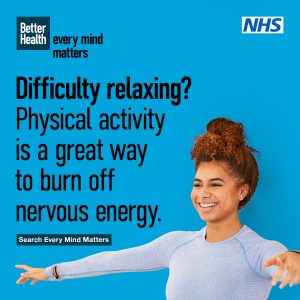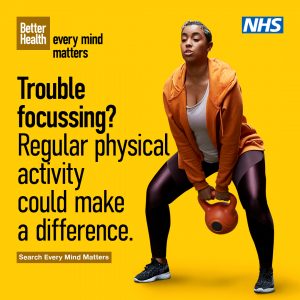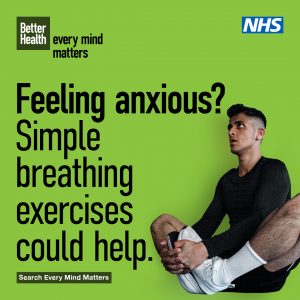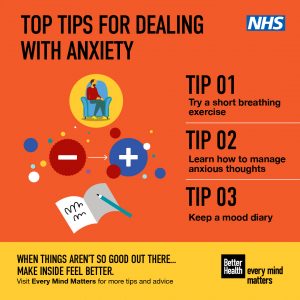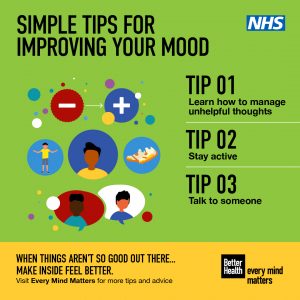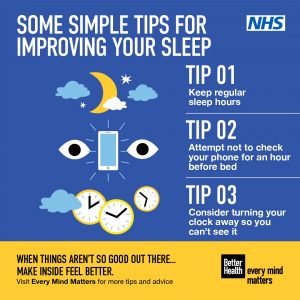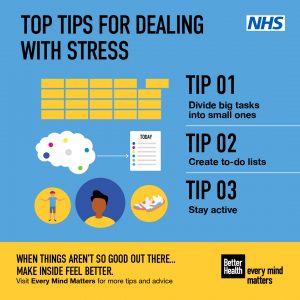The below messages are to be communicated to support the World Mental Health Day activity and raise awareness of the guidance and tools available to help adults take care of their mental wellbeing during this time and beyond, and seek support if needed:
- Our physical health and mental health are connected and those with long term health conditions or long COVID may be facing specific challenges. The Every Mind Matters COVID-19 hub has expert advice and tips to help you manage.
- Since lockdown lifted, people may have been feeling worried about going ‘back to normal’ or finding the change difficult. Search Every Mind Matters for practical tips and expert advice to help you feel more in control.
- Better Health – Every Mind Matters will get you started with a free, NHS-approved Mind Plan, available on the website. By answering five quick questions you’ll get a personalised action plan with practical tips to help you deal with stress and anxiety, boost your mood, sleep better and feel more in control.
- This is complemented by the COVID-19 content hub, which includes tips and support on coping with money worries, job uncertainty and how to ease back into socialising at your own pace. The platform also includes practical tips on dealing with stress and anxiety, boosting your mood, sleeping better and what you can do to help others.
- Get a free, NHS-approved Every Mind Matters mental health action plan to help you feel better over time.
- The Better Health – Every Mind Matters website also has a range of dedicated support and resources to help parents look after the mental wellbeing of their children and for young people to care for their own mental health
|
|
Take it step by step and only do what is comfortable and safe for you to ease back into socialising – then you can build your time back up as your confidence returns.
- Do not avoid things entirely
Avoiding the things that make us anxious can sometimes feel like the easier option in the short term, but this can make it harder to start facing our fears in the longer term. Instead, try to set yourself small but manageable targets, like meeting one person for a coffee or snack outside, or getting a haircut, and gradually build up from there. It can help to confide in a friend or family member so they can support you to overcome your anxieties.
- Make time to relax
Being able to see more of our friends and family, and visit places that might have been closed until now, is exciting. But don’t overdo it; it’s important to find regular time for yourself to relax too. - Challenge unhelpful thoughts
It’s natural to feel worried every now and again but our anxious thoughts can sometimes be unhelpful. If you can learn to identify and separate unhelpful thoughts from helpful ones, you can find a different way to look at the situation. There’s guidance on the Every Mind Matters website to help you do this.
| Sleep | Mood | Stress | Anxiety |
Find routine where you can
During lockdown, life changed for us all and we developed new routines. Even if your normal weekday or weekend habits change, some things can stay the same. Are there areas in your life where it’s easier to stick to a routine? Something as simple as going to bed and waking up at the same time each day or making sure to stick to your set lunch break can make a big difference.
- Get a free, NHS-approved Every Mind Matters action plan with simple steps to help you feel better.
Call to action(s)
- For more tips and support, search Every Mind Matters
- Search Every Mind Matters for practical tips and expert advice to help you look after your mental health and wellbeing
- The impact that COVID-19 is still having on our lives may cause us to feel anxious, stressed, worried, sad, lonely or frustrated
- Everyone has difficult feelings sometimes. It’s important to remember it is OK to feel this way and that, for most of us, these difficult feelings will pass.
- World Mental Health Day is a great time to start taking care of your mental wellbeing, especially during this period of uncertainty. Search Every Mind Matters for simple steps to get you going.
| Breathing exercises | Mood journal | Staying active |
